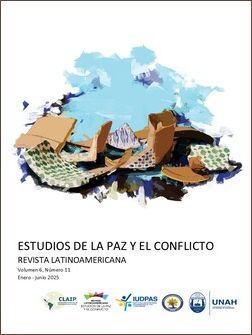The feminist peace movement: an analysis of the practical work of women in peace-building processes
DOI:
https://doi.org/10.5377/rlpc.v6i11.18719Keywords:
Woman, peace, peace processesAbstract
In the analysis of the international system, mainstream narratives dominate the different fields of study. Among the different narratives that make up this scenario, one of them is that of female absence. However, from a more detailed study, it is clear that the female presence in international peace and security is historic. However, as a result of the social structure that privileges male representation, the presence of women ended up being stereotyped and made invisible. Therefore, based on this understanding, it becomes essential to highlight women and their different experiences throughout the different historical processes of international relations, with the aim of breaking stereotypes and false dichotomies created socially, such as, for example, the relationship of women with peace movements and processes. Thus, the present work aims to analyze the role of women in peacebuilding processes, as well as answer the research question: “does the presence of women change the way peace processes are conducted?”. To this end, a qualitative study will be carried out, based on a bibliographical review developed by specialist authors and theorists in the field. Thus, from what is presented, it is clear that women present different ways of conducting peace processes, in an attempt to achieve peace and social justice through a broad and multidimensional vision.
Downloads
287
HTML (Português (Brasil)) 63
XML (Português (Brasil)) 5
EPUB (Português (Brasil)) 63
Downloads
Published
How to Cite
Issue
Section
License
Copyright (c) 2024 Latin American Journal of Peace and Conflict Studies

This work is licensed under a Creative Commons Attribution 4.0 International License.
The journal's contents are published under a Creative Commons Attribution 4.0 license (CC BY 4.0). This license allows third parties to share (copy and redistribute the material in any medium or format) and adapt (remix, transform and create from the material for any purpose, including commercial), as long as the authorship and first publication in this journal (Revista Latinoamericana Estudios de la Paz y el Conflicto, Universidad Nacional Autónoma de Honduras - Consejo Latinoamericano de Investigación para la Paz, DOI of the work) is acknowledged, a link to the license is provided and it is indicated if changes have been made to the original. The terms of the license are available online at http://creativecommons.org.




